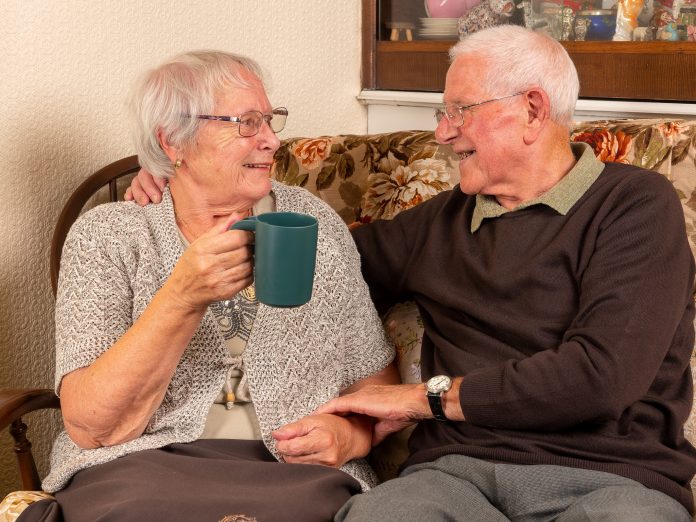Aquarate illustate the life-threatening consequences of dehydration and introduce their Hydracup, committed to improve quality of care for our loved ones
Britain’s increasing population is ageing due to a rise in longevity. By 2050, one in four of us will be aged 65+, marking a global phenomenon.
Dehydration is a huge problem within the elderly population, with 35% of individuals admitted into a care home affected by dehydration. In the UK alone, over 40,000 people are dying needlessly each year from dehydration within care.
Hospital admissions and cost to the NHS
Falls are one of the most frequent and serious injuries in the elderly. Each year, a third of over 65s fall at least once, costing the NHS £2.3 billion annually for fragility fracture treatment.
Daimon Wheddon, area clinical lead at East of England Ambulance Service, said: “Fall related calls make up a large percentage of the incidents we attend every day. We regularly see dehydration as a contributory factor in our elderly patients who have fallen; common complications include low blood pressure, weakness and dizziness, all of which can increase the risk of falls.”
Falls are just one part of dehydration related illnesses within care homes, urinary tract infections (UTIs) also account for 20% of emergency hospital admissions with an additional cost to the NHS of over £400 million a year for treatment.
Of all emergency admissions from residential and nursing homes that lead to death, 41% are potentially avoidable. The three most common causes are pneumonia (12%), UTI’s (8%) & fractures and sprains (8%); of which the two latter can be relieved by proper hydration levels.
In a country where unlimited access to safe drinking water is available, the number of deaths as a result from low hydration levels are shocking.
Fluid intake monitoring methods in care homes
Inadequate fluid intake is a major contributor to preventable dehydration. Inaccurate manual fluid paper charts have been used year after year within the care sector, despite being widely known as an ineffective tool. If staff are unaware how much each resident has had to drink, they rely on the resident remembering how much liquid they’ve consumed which can often be unreliable and can lead to discrepancies in the accuracy of fluid balance charts.
As the healthcare market continues the battle to keep up with the increasing demand and new pressures from COVID-19, remote fluid intake monitoring has never been needed more. An immense amount of added pressure has been put on care staff during the pandemic, with many workers feeling stress and anxiety to complete daily tasks before the additional paperwork and reporting needed in the current situation.
The Aquarate Hydracup
Aquarate’s mission is to reduce hydration related illnesses and related preventable deaths. We have designed Hydracup with clinicians across care markets to increase patient safety.
Our new innovative smart accurately monitors fluid intake, sip by sip, for those who need it the most. Our technology integrates with a multitude of care plans and patient software, so all your data is in the one place.
Hydracup is the only smart cup on the market which can produce accurate data that integrates into care systems, saving staff time, and delivering
quality care. The Hydracup discreetly tracks an individual’s fluid intake by measuring liquid volume automatically, allowing caregivers to proactively support further fluids to those who need it the most.
As well as recording fluid data, the Hydracup also allows you to see patterns and trends beginning within a user’s drinking habits at the click of a button, helping you tailor care around an individual’s routine.
Benefits of the Hydracup
Using the Hydracup will reduce dehydration in end users across all care environments. Improving hydration health will improve residents’ mood, stimulate their appetite and reduce disrupted sleep patterns.
Ultimately, improved hydration levels will support individuals to live independently for longer and reduce preventable hospital readmissions, avoiding the associated trauma and recovery period.
Even mild dehydration (fluid loss of 1–3%) can impair energy levels and lead to major reductions in memory and brain performance. After properly hydrating over two days, you can often see a significant change in the mood, body function and spirit of that person.
Using Aquarates Hydracare technology not only improves the health and wellbeing of those in care, but has the potential for substantial cost savings too. Automating the monitoring of hydration increases productivity savings by minimising the time spent on manually recording fluid intake on paper charts. With an average time of 6 minutes per resident, per day for recording hydration, staff can focus their efforts on other pressing caregiving tasks.
Get in touch
Hydracare is now available for use in your organisation or home environment. If you see the effects of dehydration first-hand through your work and are passionate to provide quality care and ensure patients are properly hydrated, we would love you to join our team. We have several exciting opportunities currently available.
Furthermore, if you are working in the hydration and malnutrition space, perhaps running studies or trials in this area, please get in touch as we would love to see how we could support.
Get involved
To help spread the word following our product launch and to start more conversations about dehydration, we will soon be running a webinar! We will be discussing hydration and COVID-19 recovery. If you are interested in speaking at the webinar to share your expertise on hydration or the COVID-19 virus, please get in touch. If you would like to join the webinar to hear more about the effects of hydration on recovery from the virus, go to our website to sign up.
Aquarate are also attending the ‘Dementia, Care & Nursing Home Expo’ at the NEC in Birmingham on the 15th & 16th September and the Med-Tech Innovation Expo at the end of September.











